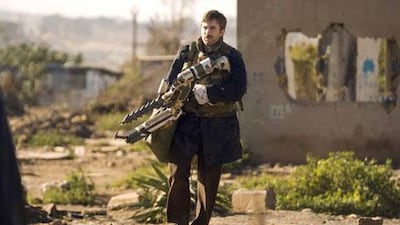Long before knighthood, Oscar victories and hobbits took Sir Peter Jackson into Hollywood's A-list, his lesser-known cinematic origins were as a splatter movie maestro. And when you watch the latest bad guy explode into a ball of gore in District 9, you can't help thinking that when Jackson decided to produce the first-time director Neill Blomkamp's quirky science fiction tale, he was harking back to the mid-1980s, when he and his friends spent their weekends working on a movie about aliens invading New Zealand to harvest humans for their intergalactic fast food franchise.
To be sure, District 9 is a much, much more polished product than Bad Taste, Jackson's appositely titled 1987 feature debut. Jackson took four years to make the film, serving as producer, director, screenwriter and cinematographer. He starred in two roles, and he created the masks worn by the aliens (he baked them in his mum's oven). But the excess of enthusiasm and imagination over experience and the constraints of conventionality are the same. (Who knows what Jackson's debut would have turned out like if he had had a Hollywood A-lister backing him and urging him, as he told Blomkamp, not to restrain his ideas.)
In District 9, a mammoth spaceship has drifted to a halt over Johannesburg. The occupants, a million extraterrestrials known derisively as "prawns", have been contained inside a fortified shantytown and treated like second-class citizens. More than 25 years later, the camp is teeming and the authorities are aiming to shift them 200km away to another camp. Enter Wikus van der Merwe, a bumbling and gormless corporate bureaucrat for the shadowy military corporate MNU, which has landed him the job of overseeing the eviction.
The apartheid allegories are too obvious to avoid, but that is not really where the essence of District 9 lies. Instead it's about Wikus's personal journey from a company man who unthinkingly pursues the conscienceless corporate goals, to someone who empathises with the aliens, which he begins to morph into after being contaminated during the eviction. That's not to say it's a primarily cerebral movie. Shot in a faux documentary mode, it relies heavily on hand-held cameras and security camera-style footage. The story quickly becomes a three-way battle among Wikus and the aliens, the unprincipled managers of MNU and a gang of Nigerians that runs the camp.
Beneath it all lies the filmmakers' passion and enthusiasm, unbridled by the typical cinema-industry accoutrements of accountants, marketers and focus groups. It's this energy, more than the entertaining premise for the story or the impressive computer-generated effects, that makes District 9 a success. Just like Bad Taste and Jackson's similar third movie, Braindead, District 9 incorporates an excessive amount of gore for comedic effect, a technique that has been dubbed "splatstick". It is impossible to count the number of times that the camera lens and actors' faces are splattered with blood and flesh.
Unlike in Bad Taste, where in one scene low-tech trick photography is used to depict a fight between the two characters that Jackson played, District 9 has the full repertoire of modern special effects. In another link between the two directors, the aliens were designed by the Wellington-based Weta Workshop, which originated in Jackson's early splatterfests and has grown to be part of the team that rendered Avatar from theory into cinematic reality.

